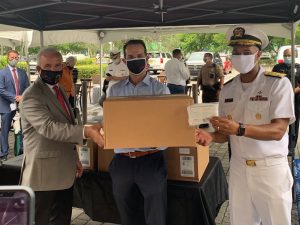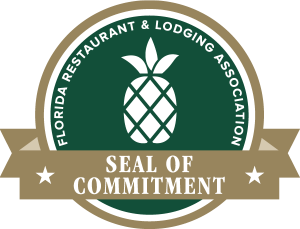
[Palm Beach, Fla] – Today, the Palm Beach Chapter of the Florida Restaurant & Lodging Association (FRLA) awarded $27,500 in college scholarships to 14 Palm Beach area culinary and hospitality high school students. Scholarship funds were raised during the annual Palm Beach E.A.T.S. (Education, Agriculture, Together, Showcase) event held earlier this year.
2020 Scholarship Winners
Hospitality & Tourism Management Program (HTMP) Students
- Faith Underwood – Palm Beach Gardens HS will attend Tallahassee Community College
- Carolyn Von Werne – Palm Beach Gardens HS will attend St. John’s University
- Jylene Velez – Palm Beach Gardens HS will attend University of Central Florida
- Falencia Aulbrice – Palm Beach Gardens HS will attend University of Central Florida
- Stephany Escobar – Palm Beach Gardens HS will attend Palm Beach State
- Emily Loomis – Forest Hill Community HS will attend University of North Florida
- Clarvens Philosthene – Olympic Heights HS will attend Barry University
- Anterica Benyard – Palm Beach Gardens HS will attend Florida Atlantic University
- Jaden Walker – Palm Beach Gardens will attend HS Rollins College
- Nathanael Jolteus – Palm Beach Gardens will attend HS Wake Forest University
- Serena Boggs – Palm Beach Gardens will attend HS Bethune-Cookman University
Culinary/ProStart Students
- Jade Kelley* – Palm Beach Gardens HS will attend Palm Beach State *FINK WINNER
- Jasmin Pickens – Wellington will attend Valencia Community College
- Mia Rideau – Palm Beach Gardens HS will attend Clark Atlantic University
“We had a tremendous increase in scholarship applications this year, and we realize the need is greater than ever,” said Nick Velardo, FRLA Committee Chair for Education and Vice President of Food and Beverage for The Breakers. “By providing scholarship support to students who are interested in the culinary and hospitality field, we strengthen the future of the industry.”
“FRLA is committed to investing in the future of the hospitality industry, and I am pleased that we can support these students’ efforts for continuing their education,” said Jodi Cross, Palm Beach County FRLA Regional Director. “I want to extend a special thanks to Tom and Lynn Fink for their ongoing generous support and contribution in honor of their son. This year, the Brian Fink Memorial Scholarship Fund contributed $4,000 to one lucky student winner.”
About the Brian Fink Memorial Scholarship
The Brian Fink Memorial Scholarship is given by Brian’s family. Brian was a career technical student who brought joy and laughter to those who knew and loved him. Brian’s family has endowed this scholarship in hopes that the recipient of this award will pass on this celebration of life to others.
###


